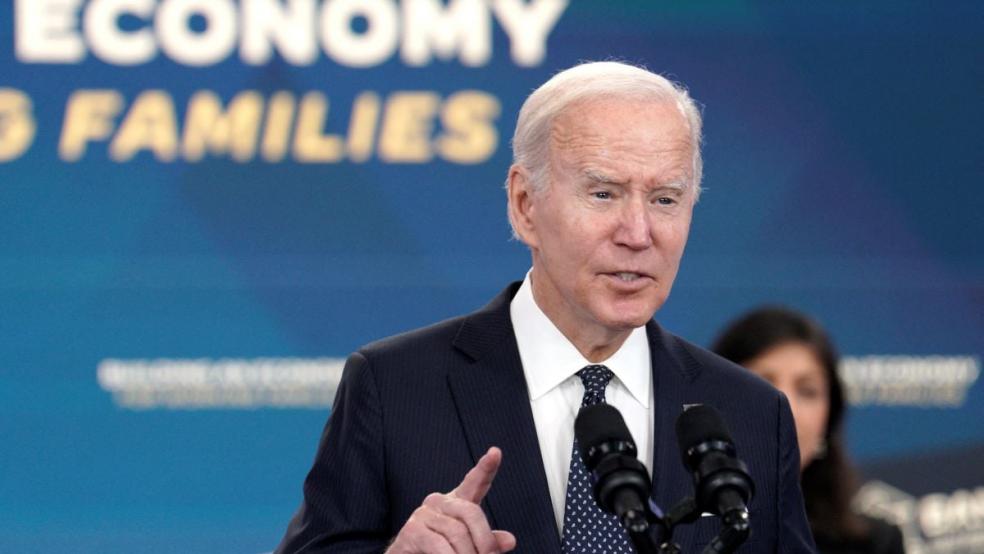In the final days before the 2022 midterm elections, President Joe Biden has sought to hammer home a closing message to voters concerned about the economy and inflation: He and his fellow Democrats are working to bring down costs for families; Republicans will make things worse if they win.
Biden was at it again on Wednesday, touting falling gas prices, a change that allows hearing aids to be sold over the counter, and a program that provides discounted or free broadband internet service to millions of Americans. Biden also announced new actions to protect Americans from “junk fees” such as surprise bank overdraft charges, some credit card late fees and hidden hotel booking costs.
The White House cited estimates that found that credit card late payment fees generated $12 billion in revenue for companies in 2020, while bank overdraft fees totaled about $15.5 billion as of 2019 and hotel resort fees came to nearly $3 billion in 2018. Baggage fees, meanwhile, produced about $6 billion in revenue for airlines last year.
“Today’s actions are going to save consumers more than $1 billion each year,” Biden said at an event with the heads of the Consumer Financial Protection Bureau and the Federal Trade Commission. “And that’s a lot of money back in people’s pockets.”
Biden then pivoted to a familiar attack on Republicans’ economic agenda:
“Folks, there are two very different ways of looking at our country. One is, as I’ve said before, the view from Park Avenue, which says help the wealthy and maybe that’ll trickle down to everyone in the country. The other is from Scranton or Claymont or thousands of cities across the country like the place I grew up. The benefit and the belief that the backbone of America are people who get up every morning and work for a living, put on their shoes, get out of bed, and go to work. The middle class. They’re the ones who built this country. That’s who our economy should work for.”
Biden has been warning that Republicans’ approach to the economy has failed and will fail again. “The Republicans have made it clear that if they win control of the Congress, they will shut down the government, refuse to pay our bills, and it’ll be the first time in our history America will default — unless I yield and cut Social Security and Medicare,” Biden said in a speech Monday. “There’s nothing — nothing — that will create more chaos, more inflation and more damage to the American economy than this.”
Administration economists reportedly estimate that GOP proposals to repeal a new minimum corporate tax and extend some 2017 business tax cuts could add $90 billion to the deficit next year.
Democratic attacks may be getting sharper, but the fundamental message is one that Biden has been repeating for some time now. “Biden’s new tone reflects the success Republican candidates have found in blaming the president and his party for the high price of food and gas, as well as for perceived increases in crime and immigration,” The Washington Post’s Toluse Olorunnipa writes, adding, “While Biden’s attacks have grown fiercer as the election has drawn nearer, the strategy of calling out Republican economic plans traces back several months to this spring, when Biden seized on the release of an 11-point policy document by Republican Sen. Rick Scott (Fla.).”
Yet Biden’s attacks do not appear to have done much to stem a surge of Republican polling momentum in the final days of the campaign. Warnings about what could happen in theory may be taking a backseat to concerns about actual economic conditions at the moment. Polls indicate that Americans trust Republicans more on the economy and inflation. And Republicans have been mounting economic attacks of their own, stoking anger about inflation and fear about Biden’s agenda.
“They have pledged to reduce government spending and to make permanent parts of the 2017 Republican tax cuts that are set to expire over the next three years — including incentives for corporate investment and tax reductions for individuals,” note Jim Tankersley and Emily Cochrane at The New York Times. “And they have vowed to repeal the corporate tax increases that Mr. Biden signed into law in August while gutting funding for the Internal Revenue Service, which was given more money to help the United States go after high-earning and corporate tax cheats.”
While Republicans promise to cut inflationary federal spending, Tankersley and Cochrane report that few economists think that the GOP’s economic agenda will do much to reduce near-term price increases. “Instead,” they write, “many say some of what Republicans are proposing — including tax cuts for high earners and businesses — could actually make price pressures worse by pumping more money into the economy.”
The magnitude of short-term federal spending cuts needed to have an effect on inflation would cause pain throughout the economy. “The amount of cuts you’d have to do to move the needle on inflation are completely off the table,” Jon Lieber, a managing director at the Eurasia Group and former aide to Republican Senator Mitch McConnell of Kentucky, told the Times.
The bottom line: The Republican agenda may not do much to fight the inflation they keep blaming on Biden and his policies — and their plans for a possible debt limit showdown carry tremendous risks for the economy. It might not matter on Election Day. Biden has tried to cast the midterms as a choice, not a referendum on his administration, but voters get to have their own say.





